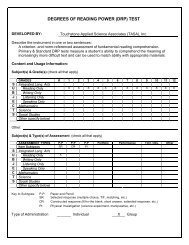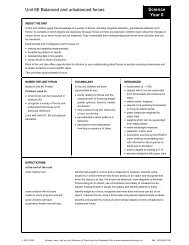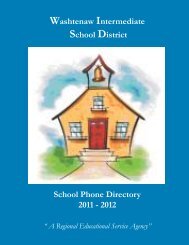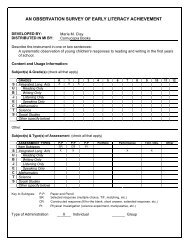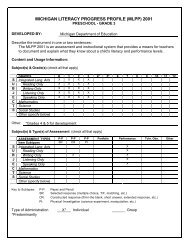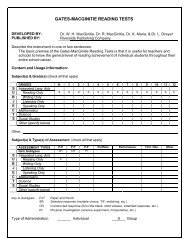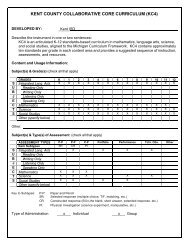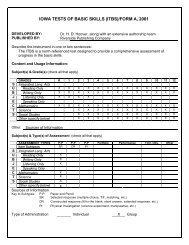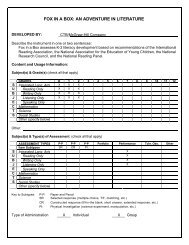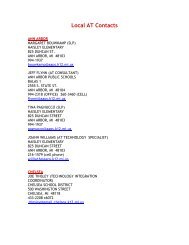Normal Course of Study: A regular education curriculum leading to a high school diploma, or the special educationcurriculum approved in the <strong>Intermediate</strong> <strong>School</strong> <strong>District</strong> Plan leading to a high school diploma. The special educationcurriculum shall include physical education, personal adjustment, and prevocational and vocational training.Occupational Therapist (OT): A professional who evaluates and determines purposeful activities to facilitate improvementof a student’s physical, fine-motor, sensory-motor, and self-care functioning.Orientation and Mobility (O+M): Support to increase the accessibility of the educational environment for a student witha disability.Paraprofessional (Parapro): A trained assistant who is directed by the classroom teacher and/or teacher consultant, tohelp provide accommodations for students with disabilities. This may include helping the teacher make adaptations to thecurriculum, assisting students with assignments, working with students in relation to the class as a whole, and helping otherstudents understand the student’s disability.<strong>Parent</strong>: The mother, father, surrogate, or legally designated guardian of the person with a disability. <strong>Parent</strong> also means theactual student with a disability when s/he reaches the age of 18 years, if a legal guardian has not been appointed byappropriate court proceedings.<strong>Parent</strong> <strong>Advisory</strong> <strong>Committee</strong> (PAC): A committee made up of parents of students with disabilities from each localeducational agency within the <strong>Intermediate</strong> <strong>School</strong> <strong>District</strong> (ISD) appointed by the ISD Board of Education. The PAC isresponsible for participating in the development of the ISD Plan and advising the ISD Board of Education on matters relatingto special education.Participation: The fourth level of MI-Access alternate assessments. Participation addresses the educational needs ofstudents with severe or profound mental impairment. These students are expected to require extensive ongoing support inadulthood. These students have significant cognitive and may have physical limitations that impair their ability to generalizeor transfer learning, and render determining their actual ability and skills difficult. Their impairments cause them to bedependent on others for most, if not all, of their daily living needs and will impact any future involvement with major liferoles.Person Centered Plan (PCP): The process of helping a person with a disability develop a life plan based on his/herinterests, strengths and needs.Physical Therapist (PT): A professional who assesses and treats a student to improve his/her level of functioning, mainlyin the area of mobility and walking skills.Picture Exchange Communication System (PECS): A system of picture symbol cards which are used as acommunication tool when verbal language is not present. It may also enhance the development of verbal language.Positive Behavior Support: A broad-based set of proactive approaches used within a comprehensive school-wide system.This school/community system supports students in learning responsible behavior and achieving academic success. The goalis not merely to “eliminate” the behavior, but to understand the behavior’s purpose and then teach the student a positivebehavior to achieve the same function.Procedural Safeguards (also known as “Rights” or “Due Process”): Regulations designed to protect students withdisabilities and their parents; see Appendix G.Psychological Evaluation: The portion of a student’s overall special education evaluation that tests general aptitudes andabilities, eye-hand coordination, social skills, emotional development and thinking skills.Public Expense: Provision of service(s) by the public school agency (PSA) at no cost to the parent(s). Under specialcircumstances, the PSA may pay for an outside evaluation, program, or service(s), which may include transportation and/orroom and board.26
Public <strong>School</strong> Agency: A public school governed by a board of education, legally constituted within a State, which hasadministrative control and direction of a public elementary or secondary school (includes both local districts and public schoolacademies/charter schools).Public <strong>School</strong> Academy: A public school governed by a board of education, created by a formal agreement/charterbetween a person or group of people and an approved educational agency or State, that is exempt from some stateeducation regulations and local school district rules in exchange for agreeing to meet certain accountability requirements.Related Services: Services specially designed to meet the unique needs of persons with disabilities through age 25. Theseservices include the following: audiological, medical, psychiatric, psychological, speech and language, or educationalevaluation; occupational, physical, recreational, music, art, or other therapy; accommodations and modifications; assistivetechnology devices and services; mobility and orientation services; transportation; school psychological; school social work;and instruction provided by special education teachers designed to assist regular education students who are homebound,hospitalized, placed in juvenile detention facilities, or preprimary age children.Resource Room: A classroom program designed for students who require 50% or less of their instructional (language arts,mathematics, science and social studies) day in a special education setting. (Elementary: 50% or less of instructional schoolday; Secondary: three periods or less of instructional school day.)Section 504: Refers to Section 504 of the Rehabilitation Act of 1973, which protects the civil rights of persons withdisabilities. It also applies to the provision of services for children whose disability is not severe enough to warrant eligibilityfor special education services, but could benefit from supportive services and classroom modifications.Self-Contained Classroom: A separate classroom, located within a general education school, used by students withdisabilities, which may have either the same categorical/educational impairment grouping or may be cross-categorical.Short-Term Instructional Objectives (STIO): Objectives written in measurable terms that relate to the annual goalsand represent expected achievement over several weeks or months but not more than one year. A report on the progresstowards these objectives must be provided to parents at least as often as every marking period.Special Education: Specially designed instruction, at no cost to the parents, to meet the unique educational needs of eachstudent with a disability who is eligible for services; designed to help each student reach his/her maximum potential. All ofthe following may be included in the definition of special education: special education classroom instruction; instruction inphysical education; instructional services such as preprimary, teacher consultant, speech and language, homebound andhospitalized, and juvenile detention facilities; ancillary and other related services such as occupational, physical, recreational,music, art or other therapy, mobility and orientation, school psychological and school social work services; supplementalaids, accommodations and modifications.Special Education <strong>Advisory</strong> <strong>Committee</strong> (SEAC): A committee appointed by the State Board of Education to advise thatBoard on matters relating to the delivery of special education.Speech Therapist: A professional trained to evaluate and provide therapy for speech and language disorders.Supported Independence: The third level of MI-Access alternate assessment. Supported Independence addresses theeducational needs of students with moderate mental impairment. These students will require ongoing support in major liferoles. They also may have cognitive limitations that impact their ability to generalize or transfer learning: they may, however,be able to follow previously learned routines and demonstrate a variety of independent living skills.Teacher Consultant (TC): A certified special education teacher, with teacher consultant approval, who providesinstructional support to students with disabilities, provides consultation to and/or team teaches with the general educationclassroom teacher and consults with parents.Transition: As defined by law, a set of decisions an IEP team makes to prepare students with disabilities for life afterschool; emphasizing interagency collaboration. (Also a commonly used term that refers to a change of building, level, grade,classroom, or activity at any age.)Transition Services: A coordinated set of activities for a student, designed within an outcome-oriented process, thatpromotes movement from school to post-school activities. These activities may include post-secondary education, vocational27




